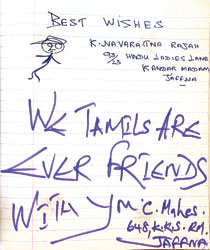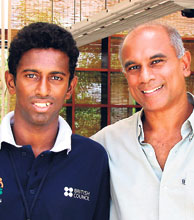Sitting
in the train to Jaffna on that August day in 1973, discovering a landscape I
had never seen before is vivid in my memory. The 4th Kandy Boy Scout Troop
from St. Anthony’s College headed by Scout Master Senarath Basnayake was on
an adventure of discovery.
It was an exciting trip, like going to another
country - men in white vetties, women in colourful saris, the rickshaws, many
Austin A 40s parked in a row, interesting aromas coming from the streetside
vendors aroused my senses that this was all different.
Our hosts from Jaffna Hindu College guided us through the streets to the school which was going to be our home for the next few days. Each of us were assigned mentors and P. Thillainathan - wide smile and friendly - introduced himself to me.
The next few days we had various Scouting activities including an early morning hike to Point Pedro. We woke up at 3 a.m. and three hours later we walked into the white sands of Point Pedro to a glorious sunrise and a cup of Kitul Palm toddy.
What stuck in my mind the most was how friendly everyone was. Thillai took me to his home for a night where I got a real taste of Jaffna hospitality. I was looked after like one of their own. I left
Jaffna with a heavy heart, hoping that someday I will return.
Before we left,
our new Scout friends – Puvirajasingham, Vivekanandan, Yoganathan,
Muruganandan, Amaranath, Balachandran, Mahes and Navaratna Rajah - wrote
goodbyes in my log book, which I cherish to this date.
One
from Mahes said, “We Tamils are ever friends with you”. Thillai wrote, “Hope
we will meet again and again.” Thillai also gave me a photograph of himself
which was my reminder of those good times.

Thillai
and I corresponded regularly and continued for a few years after I immigrated
to Canada in late 1973. I lost touch with him about 1977 and never heard
again from him. Over the years, I wondered about Thillai and by that time the
war had broken out. Yet, I yearned to meet him again, but feared whether the
worst had happened during the conflict.
Intercultural
Dialogue
The
second Intercultural Dialogue (SITHEN) workshop organized by a core group of
university students for students was held at the MAS Institute for
Management and Technology in Thulhiriya in September. The first workshop held
in Polonnaruwa in April this year did not have the participation of Jaffna
University students as they did not obtain Defence Ministry approval to
travel south. The war was yet raging. To our
delight, British Council, who sponsors this project, informed us
that Jaffna University was participating in the second workshop.
 On day
one of the programme, I wanted to talk to the Jaffna students to get some
impressions of life there but found no time. On day two during afternoon tea,
I found the Jaffna team sitting outside and struck up a conversation. On day
one of the programme, I wanted to talk to the Jaffna students to get some
impressions of life there but found no time. On day two during afternoon tea,
I found the Jaffna team sitting outside and struck up a conversation. I
mentioned that I had visited Jaffna in 1973 with my Scout Troop. They all
joked saying that they were not even thought of then as they were born in the
late 1980s. My attention was focused on Arjuna, with a wide pleasant smile
who then said, “My father was a Queen Scout at Jaffna Hindu College and he
would have been there in 1973”. I asked his name and he said, “P.
Thillainathan!”
I choked on hearing this. Not in my wildest thoughts had I imagined that there could be a connection with Thillai here. Watching all this was Lufthi, a SITHEN team member from the University of Peradeniya. Lufthi got excited and yelled out, “Call him, call him” to Arjuna. Then I quietly asked him whether he was still around and to my relief Arjuna said, “Yes, he is a retired banker from Hatton National Bank and now lives in Manipay”. The mobile signal in Manipay was not good, but we managed to have a conversation and I could not believe this was happening.
It was surreal. I later wondered as I told the tale to my wife Samantha on the phone and she said, “There must be an energy that drew you to Arjuna out of everyone else there”.
The
purpose of the SITHEN workshop is to bring the different communities
together, especially with a focus on the divided Sinhala and Tamil students.
The Jaffna students told me how amazed they were at the way they have been
welcomed by the southern Sinhala and Muslim students. Living all their life
through the war in the north, their perception of the Sinhala people as
oppressors was very different to the warmth and the hospitality they were
experiencing here. Maran, just graduated in Bio-Science from Jaffna said, “We
are so happy that our Sinhala friends accepted our side of the story”.
He was
talking of the debate, discussion and a dialoguing session that formed the
process of learning about each other, putting the past to rest and forging a
new future together. Maran went on to tell me that Nishanthi, the only girl in the Jaffna delegation was so fearful of coming south, but now having made some wonderful friends already, did not want to go back.
As I sit here with these 60 students from Colombo, Moratuwa, Jayewardenepura, Kelaniya, Peradeniya and Jaffna Universities, the positive energy and hope in the room is palpable. So much
so that I feel compassion for those people who live their lives with the
certainty that every Tamil is a Tiger and every Sinhalese a racist. Immersed
in this fear and hate, they are missing out on the richness of humanity, the
understanding and love that is natural to us all and fail to see the
uncertainty of our being, the feeling of oneness with the universe – being
interconnected – that our own Vedic and Buddhist philosophies espouse.
Even if
these perceptions were true, I see the importance of dialoguing, opening the
lines of communication in a creative way, finding a middle path to enable
skillful discussion in a safe environment to address the past and look to a
common future. This is what the workshop offered everyone and it easily
achieved its objectives.
The sessions focused on dealing with the practical
challenge in the universities with the polarization of the three communities
and sought ways to creatively work towards bringing them together.
After
the dialogue, there was a call to shed old thoughts, perceptions, prejudices
– write what you wanted to change on a paper and a symbolic gesture of
throwing it into the garbage and burning it. Thushara, a Moratuwa University
student came to the middle and said, “I no longer call myself a Sinhala, I am
Sri Lankan” to loud cheers and then someone else wondered, “In calling
ourselves Sri Lankans, do we rid ourselves of the Sinhala and the Tamil
identities ?” a question that we may all ponder as no one had an answer.
Thillai
being alive and well made my peace more complete as Sri Lanka as a nation
works towards peace, as I often wondered whether he had been a victim of the
war too. Indeed the Thillainathans were victims as their home was destroyed
in the war and they lost everything, including the photos I had sent them.
I count
my blessings as I never lost those seemingly insignificant symbols of the
past that give me a sense of comfort, security and continuity. My photo of
Thillai and the old Scout log book from the 1970s remain intact.
“We
Tamils are ever friends with you.” Thank you, Thillai and friends for
reassuring me of that. I did wonder from time to time, but never lost hope.
 The 4th Kandy Boy Scout Troop in Jaffna - 1973
The 4th Kandy Boy Scout Troop in Jaffna - 1973 The Sunday Times Link:
https://www.sundaytimes.lk/091101/Plus/plus_02.html
|





No comments:
Post a Comment